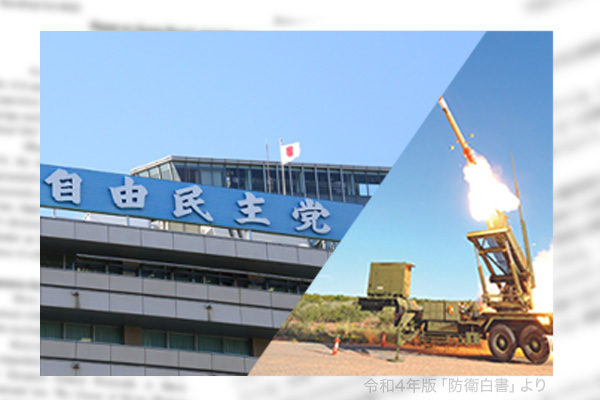Twelve lawmakers have so far put their names forward for the ruling Liberal Democratic Party’s presidential election in September. As long as the LDP remains the ruling party, its presidential election means an election to select the prime minister and the commander-in-chief of the Self-Defense Forces. At a past meeting of senior SDF officers, a prime minister said, “When I checked the Compendium of Laws before coming here, I found that I am the SDF commander-in-chief.” Such a person is not qualified to become the LDP leader.
Should five-year defense spending be left at 43 trillion yen?
The most important thing for a nation is national security and survival. Neither human rights nor prosperity can be guaranteed without national security. Japan is put under the harshest and most complex security environment since World War II ended. Those who run for the LDP presidential election are specifically requested to speak on the following three points:
(1) Is it okay to leave Japan’s five-year defense spending at 43 trillion yen?
(2) Is it okay to have Japan’s nuclear deterrence rely solely on the United States?
(3) Is Japan’s defense spending at 2% of gross domestic product limited to only FY 2027?
As for the first point, the cabinet decided in December 2022 on defense spending of about 43 trillion yen for the coming five years when three security documents including the National Security Strategy were formulated to call for the fundamental reinforcement of defense capabilities. Nearly two years after the cabinet decision, however, defense equipment prices in yen have soared due to the yen’s depreciation and inflation, making it difficult for defense spending of 43 trillion yen to achieve the fundamental reinforcement of defense capabilities that was based on what Prime Minister Fumio Kishida called “realistic simulation.”
While there is an opinion that it is necessary to review the defense spending amount from a realistic perspective, Finance Ministry officials say they do not think that the five-year defense spending should exceed 43 trillion yen. It is unrealistic to use further streamlining and rationalization efforts to make up for the factual decline of defense spending caused by the yen’s depreciation and inflation. Currently, the government seems to be moving in line with finance officials’ suggestion. Is this really okay?
The second point of nuclear deterrence is a missing part of the National Security Strategy. The Strategy only mentions Japan’s reliance on U.S. extended nuclear deterrence, making the document less than perfect. Japan is surrounded by three nuclear-armed countries. Particularly, China is rapidly increasing its nuclear weapon production. North Korea is said to be nearing the completion of a ballistic missile capable of reaching the continental U.S. Russia has been making nuclear threats and intimidation during the ongoing Ukraine war. Under these circumstances, is it okay for Japan to rely solely on the U.S. extended nuclear deterrence?
Is defense spending at 2% of GDP limited to FY 2027?
The third and final point concerns the development of defense capabilities after fiscal 2027, when the current five-year defense buildup program will end. The Kishida government has decided to raise defense spending to 2% of GDP by fiscal 2027. Japan’s defense spending will finally be on par with the North Atlantic Treaty Organization members. However, defense spending levels after the year have not been clarified. As severe security environment for Japan will continue for the foreseeable future, further defense efforts will be indispensable. On the other hand, there is an opinion that the “2% of GDP” policy is limited to the Kishida government, with any future policy left blank.
If Japan returns to the irresponsible “Basic Defense Force Concept” in which Japan does not assume threats or crisis situations but only tries to prevent it from becoming a power vacuum, the country will be internationally isolated and its national security will be bankrupt. I would like LDP presidential hopefuls fully express their respective views on national security.
Kunio Orita is a member of the JINF Planning Committee and a special professor at Reitaku University. He is a retired Lieutenant General of the Japan Air Self-Defense Force.


